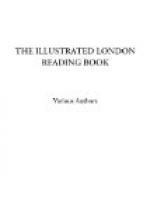As they are naturally inhabitants of warm climates, and made still more delicate by constant residence in rooms, great care should be taken in winter that this favourite bird be not exposed to cold air, which, however refreshing to it in the heat of summer, is so injurious in this season that it causes sickness and even death. To keep canaries in a healthy and happy state, it is desirable that the cage should be frequently hung in brilliant daylight, and, if possible, placed in the warm sunshine, which, especially when bathing, is very agreeable to them. The more simple and true to-nature the food is, the better does it agree with them; and a little summer rapeseed mixed with their usual allowance of the seed to which they have given their name, will be found to be the best kind of diet. As a treat, a little crushed hempseed or summer cabbage-seed may be mixed with the canary-seed. The beautiful grass from which the latter is obtained is a pretty ornament for the garden; it now grows very abundantly in Kent.
The song of the canary is not in this country at all like that of the bird in a state of nature, for it is a kind of compound of notes learned from other birds. It may be taught to imitate the notes of the nightingale, by being placed while young with that bird. Care must be taken that the male parent of the young canary be removed from the nest before the young ones are hatched, or it will be sure to acquire the note of its parent. The male birds of all the feathered creation are the only ones who sing; the females merely utter a sweet chirrup or chirp, so that from the hen canary the bird will run no risk of learning its natural note.
* * * * *
INDUSTRY AND APPLICATION.
Diligence, industry, and proper improvement of time are material duties of the young. To no purpose are they endowed with the best abilities, if they want activity for exerting them. Unavailing, in this case, will be every direction that can be given them, either for their temporal or spiritual welfare. In youth the habits of industry are most easily acquired; in youth the incentives to it are strong, from ambition and from duty, from emulation and hope, from all the prospects which the beginning of life affords. If, dead to these calls, you already languish in slothful




